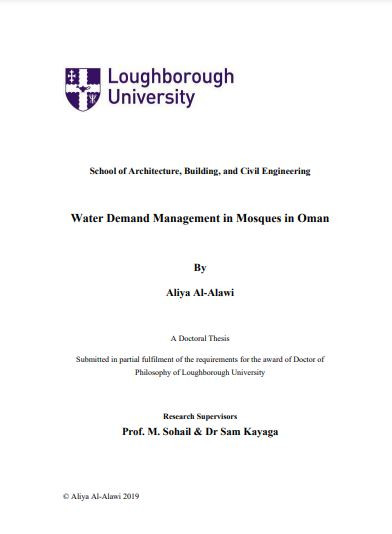The six Gulf Cooperation Council (GCC) countries face the most severe water shortages in the world today yet exhibit the highest global water consumption (500 litres per capita per day) combined with minimal efforts or measures to manage or conserve water use. While the literature is rich with practices and recommendations to reduce water use in the private sphere, very little research has been conducted for public buildings such as mosques (public buildings for Muslims to pray). These public buildings are under government management and allow water to be used freely, with no price controls or restrictions. At the same time, an essential preparation for salah (prayer), which Muslims must perform five times a day, is wudu (ablution or washing with water). The Sunnah (which discusses traditional customs and practices of the Islamic community) prescribes that the ideal ablution uses only a small amount of water: the Prophet Mohammed (PBUH) himself used just 0.6 litres. This study, which analyses ways to manage water demand in mosques in Oman, seeks to help address the issue – thus contributing to the literature on water demand management in similar countries worldwide.
This research thesis revealed alarming results, up to 7 litres of water used per wudu. The research involved a combination of qualitative and quantitative techniques, including 41 interviews, 120 observations, 120 measurements of water consumption and analysis of two years of water bills for around 688 of mosques in Muscat (capital city of Oman). It is anticipated the impact of the study could be massive, 80% of water consumption conserved in mosques, achieved via policy recommendations that promote the application of suitable tools and techniques and result in improved efficiency of appliances and water reuse.
This research, which covers three major variables influencing water use (efficient appliances, policies, and reuse), will help decision-makers in taking the most appropriate action for water demand management. The findings provide an example for other GCC countries, as well as contributing to global knowledge.
